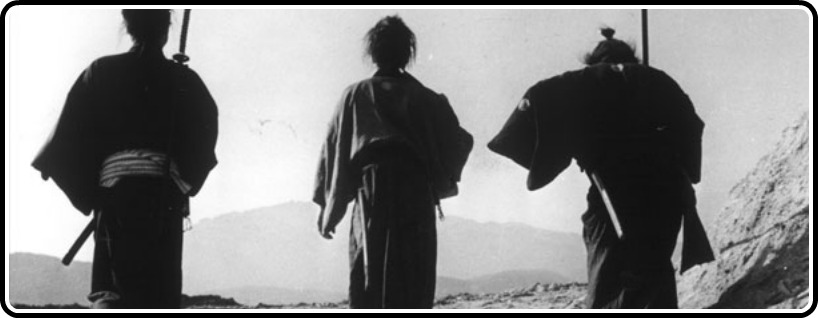Over the past few months, The Criterion Collection has begun rolling out a handful of releases clocking in at a solid $10 off the normal suggested retail price. With films like this month’s The Organizer as well as one of the first entries in this neo-Essential Arthouse type series of Criterion proper releases The Makioka Sisters, they may be free of the beloved supplements that make Criterion’s releases so sought after. However, the quality of the films themselves, as well as the transfers both audio and video wise, are more than deserving of that almighty Criterion ‘C.’ And the best one of the lot may very well be Hideo Gosha’s first feature, Three Outlaw Samurai.
A prequel of sorts, Outlaw is, as mentioned above, Gosha’s debut feature, and follows the story of a loner ronin who gets himself embroiled in the antics of two other samurai, who have been brought in to take out a group of bandits who were behind the kidnapping of a magistrate’s daughter. Clocking in at a taut 93 minutes in length, the film may not be Gosha’s crowning gem, but there are rarely films this kinetic and this bombastic that are equally economic in both storytelling and visual aesthetic.
The film’s biggest star is obviously Gosha. Action wise, the film is perfectly made. Featuring Gosha’s patented unflinching, yet starkly stylized camera, each set piece is perfectly choreographed, and allowed to breath for the optimal impact both physically and emotionally. The plot itself is rather ho-hum, your average revenge narrative of a group of men brought in to take back a kidnapped daughter.
Based on a Japanese TV series of the same name, the narrative itself may not be all that engaging, but Gosha makes it visually impressive with an emotive camera, either standing still to allow action to breathe, or moving with the most potent of filmmaking style and force. Toss in some superb and truly reference quality black and white cinematography from Tadashi Sakai (particularly in those stunning dark close-ups), and you have one of the more gorgeous films of this time period.
Coming to us thanks to Shochiku, the film is one of a cavalcade of masterworks that the company was the face of. With a stable of directors including the likes of Ozu, Gosha, Kurosawa and Criterion “it” director (or so the 27 films from him currently found on the Collection’s Hulu Plus page would make it seem) Keisuke Kinoshita, the studio is one of film history’s greatest foreign cinematic diplomats, giving the world gem after gem after gem. This is just another classic that was aided by one of the film world’s greatest unsung studios.
Starring the likes of Tetsuro Tamba (Harakiri), Isamu Nagato, Mikijiro Hira (The Face Of Another) and Miyuki Kuwano (seen in films from the likes of Ozu and Kurosawa) the film features a collection of fantastic performances, each of which adds a great level of depth to the film. Each of the titular samurai have their own aesthetic, as do the cartoonishly brash bandits, and the damsel in distress. They archetypes may be a bit paint-by-numbers, but one could really do worse than getting lost in a visually verbose tale of revenge helmed by Hideo Gosha and featuring this all-star cast.
The score by Toshiaki Tsushima is superb, but the real below the line star here has to be Kazuo Ota’s editing, which gives the picture an almost punk rock sense of percussive narrative momentum, adding a really palpable bit of edginess to the thriller. Never allowed to ease into the story, the viewer is always on the edge of their seat, partially due to the wonderful editing work by Ota.
As far as a release goes, this film is admittedly lacking in supplements, hence the film’s lighter price tag. There is a trailer here, as well as a gorgeous booklet with both an essay by Bilge Ebiri, but more importantly stunning artwork from artist Greg Ruth. It’s really a beautiful little booklet, and the overall look and feel of the release is superb. The transfer is stunning, with the black and white cinematography and the film’s soundtrack really popping off the screen and out of the speakers. Would one like to have seen something like a retrospective or a commentary? Yes. I feel as though a film like this could really benefit from something adding to each viewing of the film, but with how damn entertaining and action packed this film is, one would be hard pressed to find a reason not to pop this sucker in and get lost in the gorgeously composed world crafted by the impeccable and iconic Hideo Gosha.
With both his first and second (Sword Of The Beast) found within the Collection as of the writing of this, one can only hope that this will spark more films of the director to make it to Criterion. He is one of his generation’s most visually striking directors, with some of the most dark and brooding films crafted by him or his fellow samurai genre staples. Onimasa, a fantastic yakuza film, is not only one of Gosha’s very best features, but would be one of the better additions to Criterion in some time. Yakuza features are always a welcome addition to Criterion’s collection, so hopefully we may ultimately see that come to light one day. Or maybe one of the three films that Criterion currently has of Gosha’s that aren’t found within the collection (Hunter In The Dark, Death Shadows, Bandits Vs. Samurai Squadron)? All three films have their own respective merits, and would be welcome additions to either Criterion proper, or one of the more hotly sought after Eclipse box sets in a long while. But until then, this is more than worthy.



